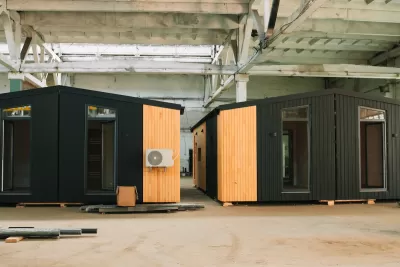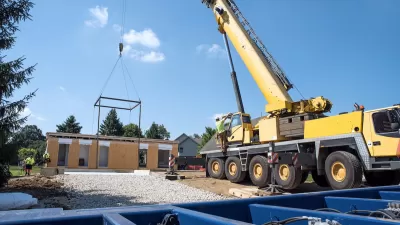Tweaks to building codes, zoning regulations, and financing mechanisms could unlock the potential of modular construction in the United States.

In an article for the Center for American Progress, Michela Zonta highlights the advantages of modular construction, arguing that encouraging more modular home building can reduce construction and housing costs, get homes built faster, and improve safety for workers.
According to Zonta, “If governments engage in coordinated initiatives at all levels to bring modular building to scale, it could also help make housing stock more resilient and sustainable relative to the challenges of climate change.”
While modular construction makes up just 3 percent of U.S. residential housing stock, it represents 45 percent of housing in Finland and Norway. “Several factors have limited the United States’ market share, including financing and payment schedules, building codes and zoning, transportation requirements, labor shortages and costs, and stereotypes.”
The article recommends that governments “Expand financial resources for the modular construction of affordable housing,” standardize building and land use codes for modular building, and incentivize more modular production through tax credits and other mechanisms.
FULL STORY: Fact Sheet: Using Modular Building To Increase Affordable Housing Stock

Alabama: Trump Terminates Settlements for Black Communities Harmed By Raw Sewage
Trump deemed the landmark civil rights agreement “illegal DEI and environmental justice policy.”

Planetizen Federal Action Tracker
A weekly monitor of how Trump’s orders and actions are impacting planners and planning in America.

The 120 Year Old Tiny Home Villages That Sheltered San Francisco’s Earthquake Refugees
More than a century ago, San Francisco mobilized to house thousands of residents displaced by the 1906 earthquake. Could their strategy offer a model for the present?

In Both Crashes and Crime, Public Transportation is Far Safer than Driving
Contrary to popular assumptions, public transportation has far lower crash and crime rates than automobile travel. For safer communities, improve and encourage transit travel.

Report: Zoning Reforms Should Complement Nashville’s Ambitious Transit Plan
Without reform, restrictive zoning codes will limit the impact of the city’s planned transit expansion and could exclude some of the residents who depend on transit the most.

Judge Orders Release of Frozen IRA, IIJA Funding
The decision is a victory for environmental groups who charged that freezing funds for critical infrastructure and disaster response programs caused “real and irreparable harm” to communities.
Urban Design for Planners 1: Software Tools
This six-course series explores essential urban design concepts using open source software and equips planners with the tools they need to participate fully in the urban design process.
Planning for Universal Design
Learn the tools for implementing Universal Design in planning regulations.
Clanton & Associates, Inc.
Jessamine County Fiscal Court
Institute for Housing and Urban Development Studies (IHS)
City of Grandview
Harvard GSD Executive Education
Toledo-Lucas County Plan Commissions
Salt Lake City
NYU Wagner Graduate School of Public Service





























